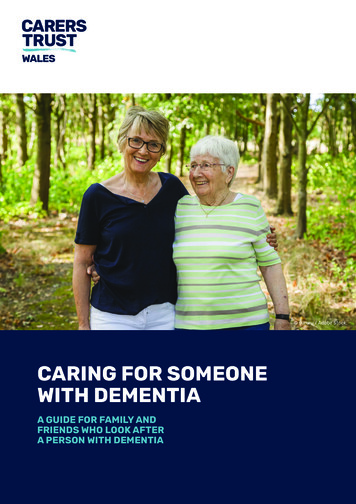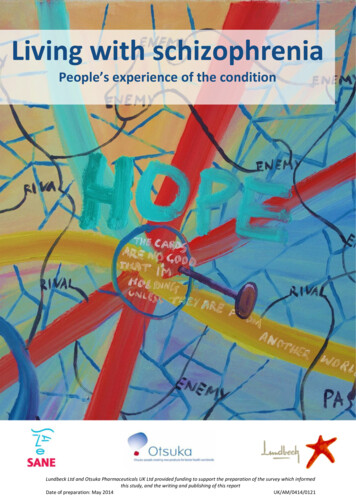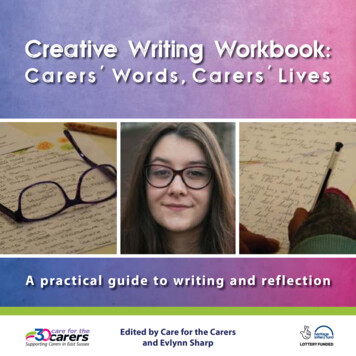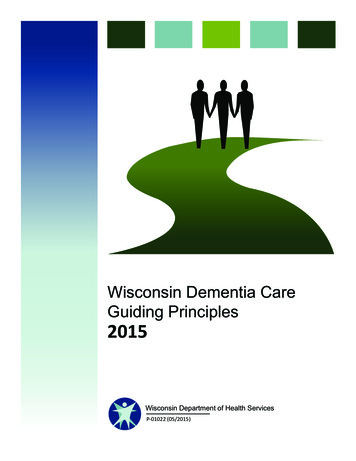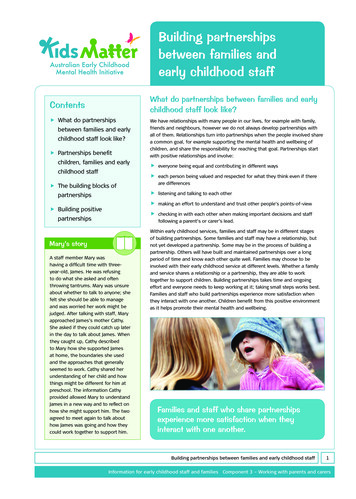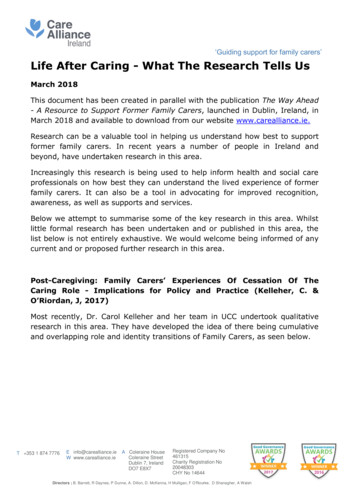
Transcription
‘Guiding support for family carers’Life After Caring - What The Research Tells UsMarch 2018This document has been created in parallel with the publication The Way Ahead- A Resource to Support Former Family Carers, launched in Dublin, Ireland, inMarch 2018 and available to download from our website www.carealliance.ie.Research can be a valuable tool in helping us understand how best to supportformer family carers. In recent years a number of people in Ireland andbeyond, have undertaken research in this area.Increasingly this research is being used to help inform health and social careprofessionals on how best they can understand the lived experience of formerfamily carers. It can also be a tool in advocating for improved recognition,awareness, as well as supports and services.Below we attempt to summarise some of the key research in this area. Whilstlittle formal research has been undertaken and or published in this area, thelist below is not entirely exhaustive. We would welcome being informed of anycurrent and or proposed further research in this area.Post-Caregiving: Family Carers’ Experiences Of Cessation Of TheCaring Role - Implications for Policy and Practice (Kelleher, C. &O’Riordan, J, 2017)Most recently, Dr. Carol Kelleher and her team in UCC undertook qualitativeresearch in this area. They have developed the idea of there being cumulativeand overlapping role and identity transitions of Family Carers, as seen below.T 353 1 874 7776E info@carealliance.ieW www.carealliance.ieA Coleraine HouseColeraine StreetDublin 7, IrelandDO7 E8X7Registered Company No461315Charity Registration No20048303CHY No 14644Directors ; B. Barrett, R Daynes, P Dunne, A. Dillon, D. McKenna, H Mulligan, F O’Rourke, D Shanagher, A Walsh
‘Guiding support for family carers’Source: Post-Caregiving: Family Carers’ Experiences of Cessation of theCaring Role Implications for Policy and Practice; Dr Carol Kelleher and DrJacqui O’ Riordan; Institute of Social Science in the 21st Century (ISS21),University College Cork In collaboration with: West Cork Carers Support Group,Family Carers Ireland and Care Alliance Ireland. Full report available todownload from http://www.carealliance.ie/publications formercarers.Routes to becoming a carer (Larkin, M. and Milne, A., 2017).Larkin and Milne (2017) identify six routes to becoming a former carer, namelywhen the cared-for person;1.2.3.4.diesis admitted to a hospitalis admitted to a hospiceis admitted to long-term care (i.e. permanently admitted to a nursingor residential care1. home or continuing care in hospital)5. recovers from their health problem (e.g. hip fracture)6. goes into remission (e.g. for cancer patients)T 353 1 874 7776E info@carealliance.ieW www.carealliance.ieA Coleraine HouseColeraine StreetDublin 7, IrelandDO7 E8X7Registered Company No461315Charity Registration No20048303CHY No 14644Directors ; B. Barrett, R Daynes, P Dunne, A. Dillon, D. McKenna, H Mulligan, F O’Rourke, D Shanagher, A Walsh
‘Guiding support for family carers’Source: Larkin, M., & Milne, A. (2017). What do we know about older formercarers? Key issues and themes. Health & Social Care in the 6406Post Caring Model (Larkin, M., 2009)This model identified three distinct stages in transitioning to becoming aformer carer, namely, ‘the post-caring void’, ‘closing down the caring time’ and‘constructing life post-caring’.The postcaring void comprises former carers’ experiences, including a sense ofloss or purpose, identity transition and losing a sense of equilibrium within thefamily – that is, a form of displacement.Closing down the caring time comprises former carers’ experiences of changedroutines and coping with their own and other family members’ grief.Constructing life post-caring comprises former carers’ experiences of letting goand moving on to reconstruct life post-caring. This phase involves rebuildingfamily ties, re-uptake of interests, taking part in some other type of carerelated activity (e.g. becoming a carer again, performing caring tasks forothers [e.g. neighbours/friends/other family members], joining or volunteeringwith carer/former carer organisations, carer groups etc.).The term ‘serial carer’ has been coined by Larkin to describe how some familycarers after their caring ends for one person recommence the caring role againfor someone else.Source: Life after Caring: The Post-Caring Experiences of Former Carers, MaryLarkin, The British Journal of Social Work, Volume 39, Issue 6, 1 September2009, Pages 1026–1042, https://doi.org/10.1093/bjsw/bcn030Three post-caring stages: ‘the loss of the caring world’, ‘living in loss’and ‘moving on’ (Cronin et al., 2015).This primary research, undertaken in collaboration with Care Alliance Ireland,represented the first formal research to be published in Ireland on this topic,and involved interviewing a number of former family carers of people withParkinson’s disease.T 353 1 874 7776E info@carealliance.ieW www.carealliance.ieA Coleraine HouseColeraine StreetDublin 7, IrelandDO7 E8X7Registered Company No461315Charity Registration No20048303CHY No 14644Directors ; B. Barrett, R Daynes, P Dunne, A. Dillon, D. McKenna, H Mulligan, F O’Rourke, D Shanagher, A Walsh
‘Guiding support for family carers’T 353 1 874 7776E info@carealliance.ieW www.carealliance.ieA Coleraine HouseColeraine StreetDublin 7, IrelandDO7 E8X7Registered Company No461315Charity Registration No20048303CHY No 14644Directors ; B. Barrett, R Daynes, P Dunne, A. Dillon, D. McKenna, H Mulligan, F O’Rourke, D Shanagher, A Walsh
‘Guiding support for family carers’The first of the three stages is loss of caring role, in which former carers’experiences include loss of identity as a carer, of role as carer and of the closebond with the care receiver as well as the social relationship with the networkof healthcare professionals. The second is living with loss, where former carersexperience mixed emotional reactions, such as guilt, relief, anger and a senseof urgency and of economic and social adjustment (e.g. due to lack of carersupports). The third and final stage, moving on, entails former carers’experience of reconstructing life post-caring, including experiences ofreconstructing one’s identity.Source: Cronin, P, Hynes, G., Breen, M., McCarron, M., McCallion, P., &O'Sullivan, L. (2015). Between worlds: The experiences and needs of formerfamily carers. Health & Social Care in the Community, 23(1), September%202011.pdfT 353 1 874 7776E info@carealliance.ieW www.carealliance.ieA Coleraine HouseColeraine StreetDublin 7, IrelandDO7 E8X7Registered Company No461315Charity Registration No20048303CHY No 14644Directors ; B. Barrett, R Daynes, P Dunne, A. Dillon, D. McKenna, H Mulligan, F O’Rourke, D Shanagher, A Walsh
Directors ; B. Barrett, R Daynes, P Dunne, A. Dillon, D. McKenna, H Mulligan, F O'Rourke, D Shanagher, A Walsh 353 1 874 7776 Life After Caring - What The Research Tells Us March 2018 . Jacqui O' Riordan; Institute of Social Science in the 21st Century (ISS21), University College Cork In collaboration with: West Cork Carers Support Group
